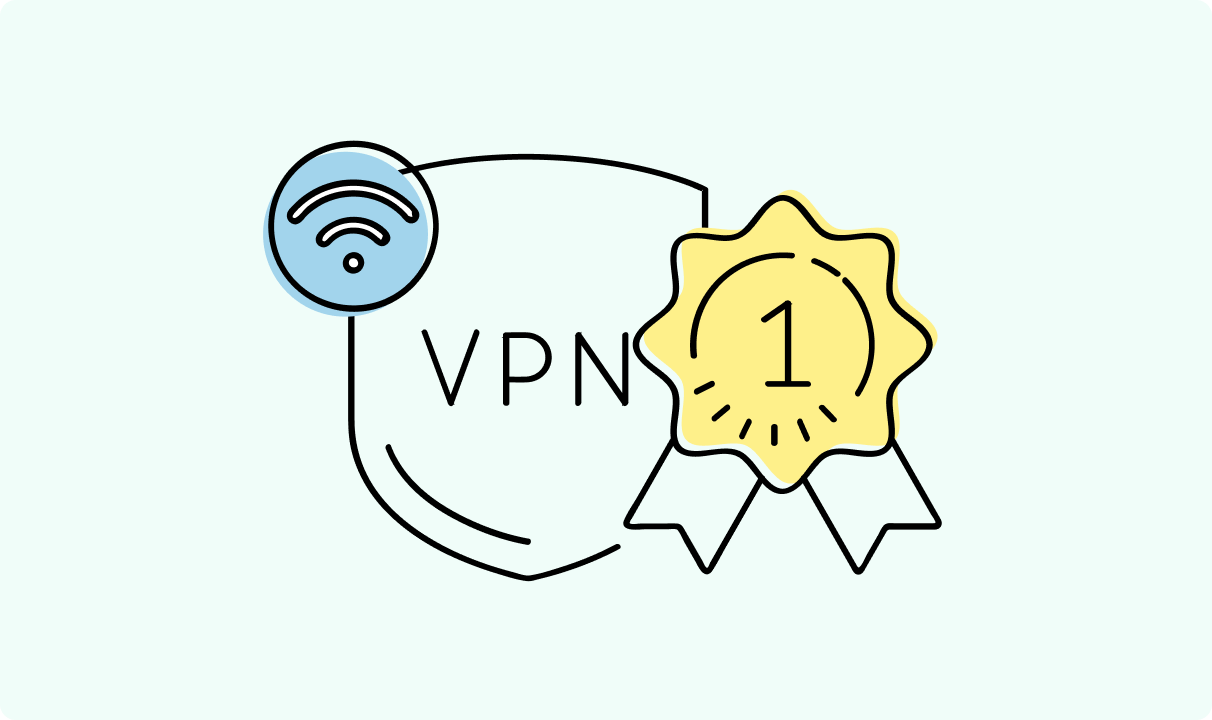DNS (Smart DNS) vs VPN: Key Differences and Benefits Explained
More than one tool can be fit to achieve the same task. Usually, it's best to choose the most universal one, but the simplicity of the alternative might be tempting. Such is the choice between a smart DNS and a VPN service.
Smart DNS is more of a quality-of-life improvement, allowing you to bypass the most basic blocks. A VPN server, on the other hand, is a full-fledged security and privacy solution for everything you do online.
Granted, smart DNS services still have their applications, and you might be tempted to use both. To learn how to wield is to understand their differences and benefits, which is exactly what this article will explain.

Adomas Šulcas
4 min read
What is a DNS?
Domain Name System is a crucial part of the internet infrastructure that translates IP addresses into human-readable names. We can think of it as a phone book of the internet.
When you call someone, you don't need to enter the phone number every time. If you have it saved, your phone will relate the name with the number.
A DNS server accomplishes a similar function on a larger scale within the internet infrastructure. Your device sends a domain name (such as cometvpn.com) to the DNS server, which then translates it into the website's IP address (for example, 192.158.1.38).
This process is instantaneous and allows you to visit websites without memorizing IP addresses. It does not hide your identity in any way but has some other applications.
DNS servers enable websites to support dynamic updates and have more than one IP address refer to the same website. As such, it's also crucial for load balancing and preventing DDoS or other attacks.
Unfortunately, DNS infrastructure also allows certain restrictions. Websites might block users with certain DNS servers, and governments can practice DNS blocking. In both cases, restricted IPs become unavailable in certain regional DNS servers.
Since DNS servers act as phone books, one solution is using a different DNS server to bypass the restrictions. That's where private DNS and smart DNS services come in.
What is Smart DNS?
By default, you use a DNS server supplied by your Internet Service Provider (ISP). If you were to encounter any internet restrictions, your local DNS would likely be the culprit.
It's fairly easy to change it, and there are many DNS servers to choose from. Cloudflare (1.1.1.1) and Google Public (8.8.8.8) are a few of the most popular ones. However, manually switching to them is just a temporary solution.
A smart DNS service automates the process of changing between multiple DNS servers. It's best for accessing geo-restricted content when the restrictions are imposed on your local DNS server used by your ISP.
Websites might apply different restrictions based on visitors' DNS servers. A smart DNS service will regularly check what DNS is needed. If the content is restricted, your requests will be routed via a different DNS server until you can access it.
Paid subscriptions are required to use smart DNS services as additional infrastructure, and sometimes proxy servers are needed. Despite the expenses, it still has at least two weak points.
Your IP address isn't hidden and can still signal your geolocation and other information to websites. They can use it to impose geo-restrictions no matter what DNS server you are using. With VPNs, this only happens when VPN not connecting for some reason.
Additionally, smart DNS services do not provide more security and privacy benefits, such as data encryption. In fact, there is a risk that an unreliable smart DNS provider will be the one spying on you.
What is a VPN?
A Virtual Private Network (VPN) sets up an encrypted tunnel between your device and the internet. It functions by routing all the data through a VPN server, which encrypts it and hides your original IP address. So, why use a VPN instead of DNS?
Ensuring privacy is what, by definition, a VPN service does best. A reliable VPN provider, such as CometVPN, won't keep any logs. Not even your ISP will be able to snoop around your online activity.
A VPN connection also protects you from hacker attacks. Performing cyberattacks is much more difficult if your IP address is hidden and data encrypted.
By hiding your identity, a VPN connection allows you to sidestep various internet restrictions, including DNS blocking. The websites you visit will not know your IP address other than the one you choose as your VPN server. Some countries restrict VPNs for this reason (check Are VPNs legal for more).
For example, if the content you want to access is only accessible to users from Germany, you can simply choose one of the available IP addresses from there. Learning how to change VPN location is extreemly easy.
The VPN provider will use a DNS needed to access the content, so in most cases, a smart DNS service is no longer needed.
DNS vs. VPN vs. SmartDNS
DNS Server | Smart DNS | VPN | |
|---|---|---|---|
| Privacy | Your requests are visible to your ISP and DNS provider. | Your requests are visible to your ISP and smart DNS provider. | Changes your IP address and encrypts data from your ISP, government, or anyone else intruding. |
| Speed | Might improve browsing speed in some cases. | Can slow down your internet connection. | Minor delay due to encryption. |
| Content unblocking | Translates domain names into IPs. It might help bypass some restrictions. | Sidesteps most restrictions based on DNS blocking. | Changing your IP address and encrypting data will bypass most online restrictions. |
| Price | Most are free. | Small monthly subscription. | Small monthly subscription. |
| Overall Security | Improves your network's security, especially if encryption is used. | Improves your network's security, especially if encryption is also used. | Comprehensive online security tool. |
| Data Logs | The DNS service provider may keep logs. | The smart DNS service provider may keep logs. | Reliable VPNs have strict no-logs policies. |
Using Smart DNS and a VPN Simultaneously
Theoretically, you can use a smart DNS service and a VPN together. Some providers even offer it as an additional service. However, it should be clear from the table above that there's little to gain from using a smart DNS and a VPN together.
It's unnecessary for most uses, and these services might even conflict with one another. Along with changing your IP address and encrypting data, VPNs also use their own DNS service. Smart DNS service becomes redundant in such cases.
Conclusion
A smart DNS service is a simple solution for bypassing DNS-based restrictions. But it isn't a complete tool, yet it still costs like one.
If you're going to pay for a subscription, you might as well choose a comprehensive solution. A VPN is a better choice that not only bypasses restrictions but ensures your security and privacy online.
Frequently Asked Questions
1. Does changing DNS improve the internet?
Usually, your internet service provider (ISP) will use the most efficient DNS server possible. In some cases, other DNS servers might do a better job retrieving IP addresses, but you shouldn't expect a major increase. Browsing speed depends more on the responsiveness of the target server.
2. Does DNS change IP location?
No. Unlike a VPN, changing your DNS server, even with a smart DNS, does not change or hide your IP address. Your ISP and the websites you visit can still identify you or block content based on your IP.
3. Is 1.1 1.1 the fastest DNS?
Many benchmarks claim that the 1.1.1.1 DNS operated by Cloudflare is the fastest one. However, the DNS that is fastest for you depends on your location and internet connection. It's best to test a few different ones and see for yourself before starting to use a smart DNS.
4. What happens if I turn off DNS?
The internet would not function without a DNS. You can try to bypass it by using IP addresses instead of domain names to browse. In some cases, you will succeed in entering websites. In others, some errors might occur.
5. Can a VPN cause DNS issues?
Most VPN providers will simply override the DNS server you are using with its own one. It replaces the effects even of a smart DNS service with a better, encrypted connection. Otherwise, there shouldn't be any major issues when browsing.

Author
Adomas Šulcas
Chief Operating Officer at Growth Bite
Adomas is a technical writing expert who founded Growth Bite, a digital marketing company, focused on providing high-value SEO and content marketing services to SaaS companies.
Related articles

4 min read
Best Residential VPN Providers in 2025
A Virtual Private Network (VPN) encrypts your traffic and hides your IP address. The way these functions are accomplished affects various aspects of your online privacy and security.
Here, we'll consider using residential IP addresses instead of those originating from a data center. A residential VPN has advantages compared to traditional ones, but there are some caveats.
It all boils down to residential VPN providers. The worst ones may even create more risks than benefits. We'll end this article with a list of the best residential VPN providers on the market.

Guoda Šulcaitė
4 min read
Ethernet vs Wi-Fi: Which One is Better?
Ethernet and Wi-Fi are the two main ways to connect your computer to the internet. While Wi-Fi has received significantly more attention in recent years, especially among consumers, due to its simplicity and flexibility, ethernet is still widely used in various other applications.
Even if Wi-Fi is significantly more popular, it isn’t strictly better. Both methods have their benefits and drawbacks. Wi-Fi’s popularity comes from its ease-of-use and flexibility, but an ethernet connection can be much more useful in certain scenarios.

Adomas Šulcas

5 min read
How to Change Chrome Proxy Settings: The Ultimate Guide
A proxy server is an easy alternative to a VPN that can perform most of the functions of the latter. It’s a server that stands between your device and the destination server, taking your connection requests and forwarding them in your name.
Destination servers in almost all cases see the proxy server as the originator of the request. As such, proxies are widely used in various, mostly business-related applications whenever privacy, security, location changing, and several other factors are at play.

Guoda Šulcaitė